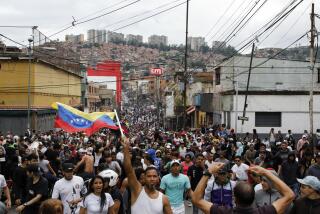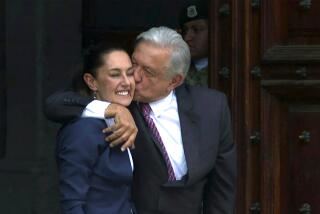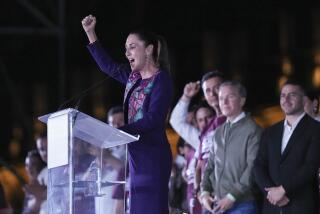PRI Leadership Vote Results in Charges of Corruption
MEXICO CITY — A leadership election that was meant to herald the revival of Mexico’s former ruling party is instead mired in fraud allegations and bedeviled by a nearly deadlocked result that threatens to engulf the Institutional Revolutionary Party in bitter infighting.
Three days after the nationwide voting, former Tabasco state Gov. Roberto Madrazo claimed victory Wednesday by the narrowest of margins over Beatriz Paredes for the presidency of the PRI, as the party is known.
But Paredes’ team accused Madrazo’s forces of the same old-style vote-buying and other corrupt practices that once were hallmarks of the PRI. That legacy of corruption was a major factor in the PRI’s loss of the presidency for the first time in 71 years to Vicente Fox in July 2000.
A PRI weakened by internal strife could be a liability for Fox, who needs to negotiate with a coherent opposition on major issues such as labor reform and modernization of the nation’s electricity network.
Fox’s conservative National Action Party and the center-left Party of the Democratic Revolution are choosing new leaders in coming weeks. Analysts have said that stronger leadership in all three parties is critical for Fox’s hopes of getting stalled reforms moving.
Despite its loss to Fox in the presidential election, the PRI remains a major political force in Mexico, controlling more congressional seats than any other party and 17 of the nation’s 32 governorships.
Fox’s victory, however, sent the PRI on a downward spiral for more than a year. The party suffered embarrassing losses in governor’s races in states such as Chiapas and Yucatan. The party held a much-ballyhooed assembly in November that called for more openness, including the first direct election of the party’s leader, as a major step toward recovery.
But the leadership vote Sunday was too close to call after the balloting, and fraud accusations soon spewed from both candidates’ camps.
Only on Wednesday did the party issue a preliminary final result, giving Madrazo 1,524,081 votes to 1,470,563 for Paredes, a difference of 1.8 percentage points. The total vote was twice as high as expected, further fueling fraud allegations.
A victory for Madrazo would position him to seek the party’s presidential nomination in 2006. He lost the PRI primary in 1999 to Francisco Labastida, who was then trounced by Fox.
The charges leveled by Paredes’ supporters sounded like those voiced by opposition parties against the PRI in the past. Campaign spokesman Jaime Aguilar Alvarez said in full-page newspaper ads Wednesday that the worst abuses occurred in Oaxaca state, including the stuffing of ballot boxes with Madrazo votes.
Aguilar said that in some Oaxaca ballot boxes--all with a high or even 100% turnout for Madrazo--more ballots were cast than were issued for the polling places.
Madrazo, the 49-year-old son of a former PRI president, campaigned as a reformer taking on the party mandarins, whom he blamed for the party’s loss to Fox. Paredes, a 48-year-old congresswoman and former governor of Tlaxcala state, portrayed herself as the voice of younger, more honest party members fed up with the corruption of the past.
Political analyst Jose Antonio Crespo said the vote was like “Soviet elections.” He said the vote was particularly questionable in Tabasco, Madrazo’s home state.
Jean Francois Prud’homme, a professor at the Colegio de Mexico who studies political parties, said that mediation by party leaders could resolve the dispute and save the party, “but if not, there is a great risk of a split. . . . The risk is one of becoming a much more fragmented system.”
Rafael Aguirre in The Times’ Mexico City Bureau contributed to this report.
More to Read
Sign up for Essential California
The most important California stories and recommendations in your inbox every morning.
You may occasionally receive promotional content from the Los Angeles Times.










